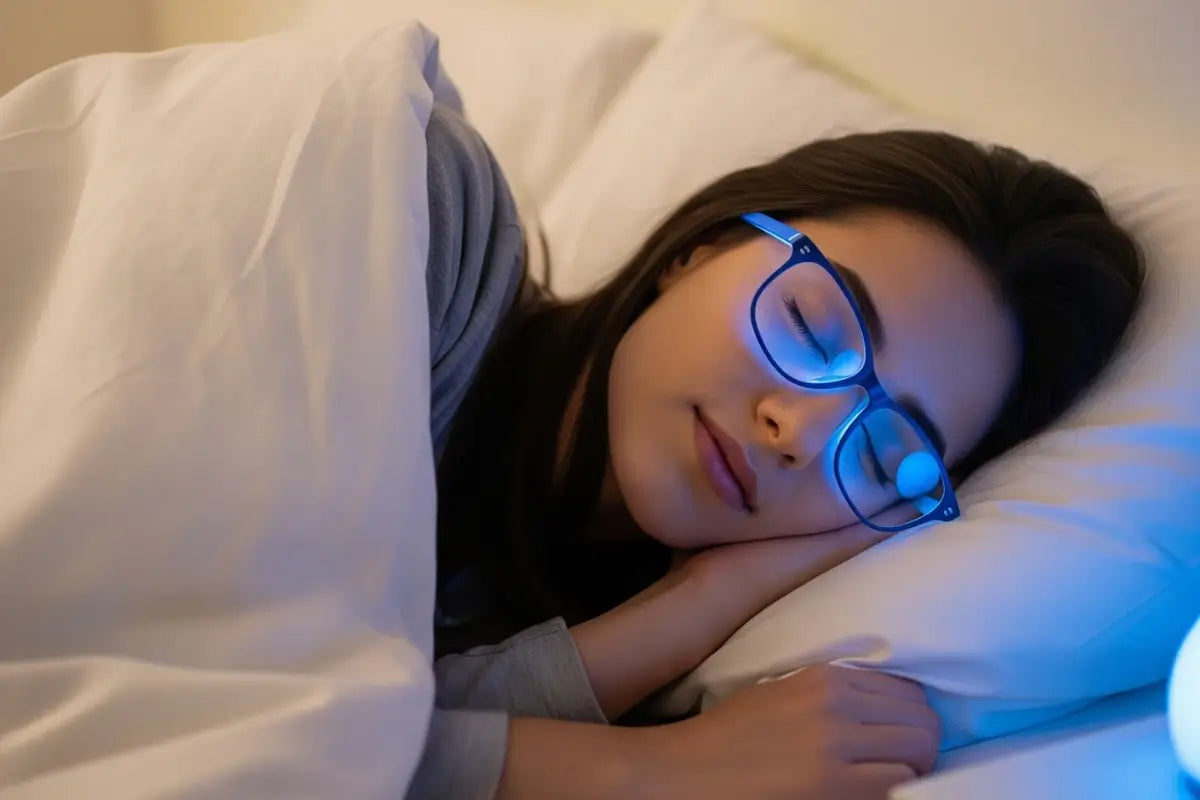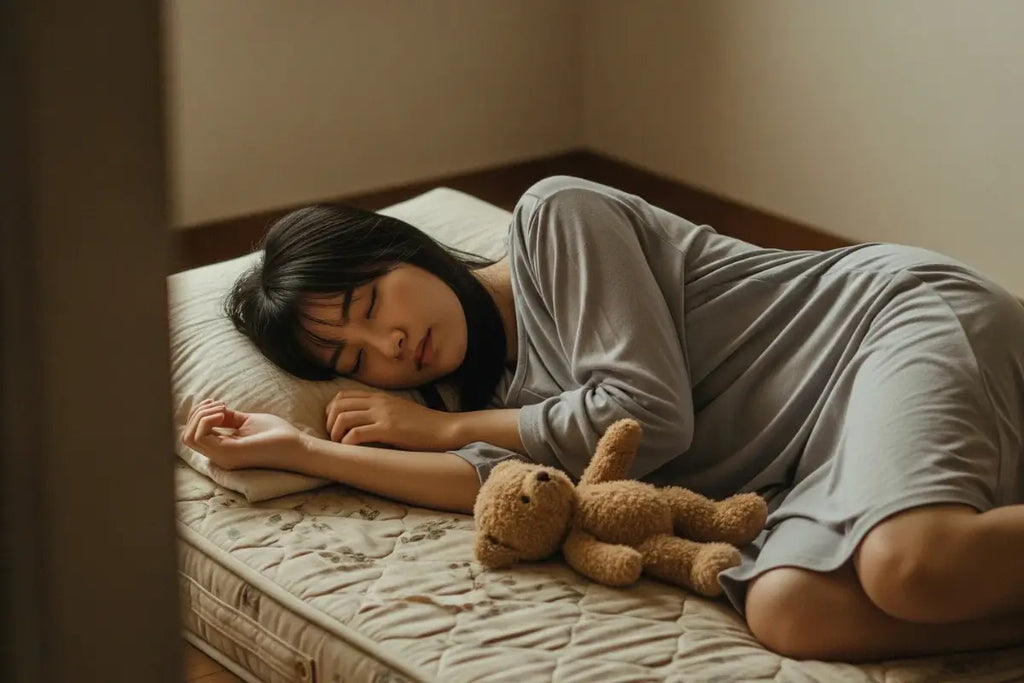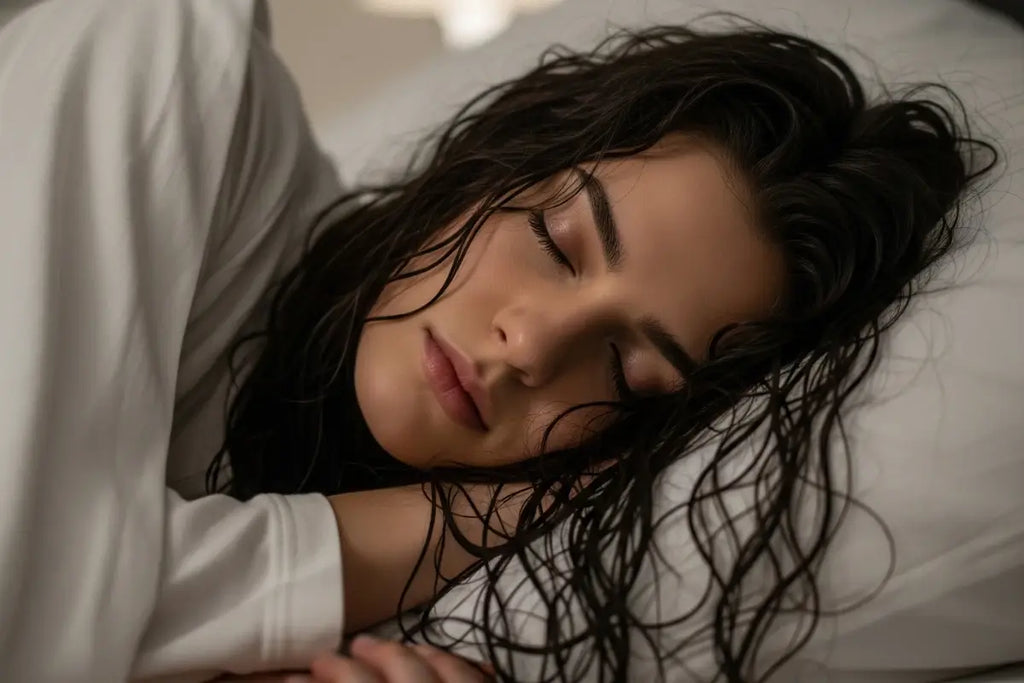Do Blue Light Glasses Work For Sleep?

Struggling with sleep due to screen time? Blue light could be the culprit. It’s everywhere, your phone, laptop, and even TV.
This article explores how blue light affects your sleep and how wearing blue light glasses might help.
Discover how these glasses can improve your sleep quality and protect your eyes. Keep reading to find out more!
Key Takeaways
-
Limit Evening Screen Time: Blue light disrupts melatonin and delays sleep.
-
Use Blue Light Glasses Before Bed: Wear them 2–3 hours before sleep for best results.
-
Choose the Right Lenses: Amber or orange-tinted lenses block more harmful blue light.
-
Support Natural Sleep Cycles: Glasses help protect your circadian rhythm, especially for shift workers.
-
Pair With a Bedtime Routine: Combine with relaxing activities to boost sleep quality even more.
What are Blue Light Glasses?
According to the Mayo Clinic , blue light glasses are eyewear designed to filter or block a portion of blue light emitted by digital screens, such as those from computers, tablets, and smartphones.
Blue light has a short wavelength and high energy, and while it occurs naturally in sunlight, artificial sources like LED screens can contribute to digital eye strain, especially with prolonged use.
These glasses aim to reduce the amount of blue light reaching the retina, theoretically easing eye discomfort and preventing sleep disruption.
Potential benefits of blue light glasses (in theory):
May reduce digital eye strain: Some small studies suggest decreased eye fatigue and dryness during screen use.
Improves visual comfort: Users report less squinting and eye itching.
Might support better sleep: By minimizing blue light at night, they could help prevent circadian rhythm disruption.
However, major reviews show no consistent evidence that they improve sleep or reduce eye strain significantly.
Safety precautions:
Use as directed, especially in the evening.
Don’t rely solely on them for eye health—schedule regular eye exams.
The Science Behind Blue Light Glasses and sleep
If you scroll your phone or watch Netflix before bed, blue light could be the reason you’re tossing and turning at night.
That light tells your brain it’s still daytime, which makes it harder to wind down and fall asleep.
Scientists have studied this and found that wearing blue light glasses in the evening can actually help your body relax and get ready for sleep.
In one review, people who wore these glasses slept faster and felt more rested. Another study looked at teens who used screens for over six hours a day, most of them had poor sleep and felt tired during the day.
Blue light glasses block the type of light that delays melatonin, the hormone that tells your body it’s bedtime.
So if you want better sleep without giving up your screens, blue light glasses might be an easy and effective fix.

Benefits of Blue Light Glasses for Sleep
Improves Sleep Quality by Helping You Fall Asleep Faster and Restfully
Blue light glasses help you sleep better by blocking the harsh blue light that comes from phones, laptops, and TVs.
This type of light tricks your brain into thinking it’s still daytime, which slows down melatonin, the hormone that makes you feel sleepy.
When you wear these glasses in the evening, your body starts relaxing and gets ready for sleep more naturally.
A 2022 review in Frontiers in Physiology found that blue light exposure made it harder for people to fall asleep and lowered sleep quality in many studies. Blue light glasses help stop that.
Reduces Eye Strain Caused by Prolonged Screen Time and Digital Devices
Prolonged screen time often causes eye strain, leading to fatigue and discomfort. Blue light glasses filter out high-energy light, aiming to ease visual stress and make screen use more comfortable, especially in the evening, though research from 2021 found they may not be more effective than other options like screen filters for relieving digital eye strain.
Boosts Melatonin Production, Supporting Healthy Sleep Hormone Regulation
Your body needs melatonin to feel sleepy at night, but blue light from phones, TVs, and tablets can slow it down.
When melatonin drops, falling asleep gets harder. That’s where blue light glasses help,they block the sleep-disrupting light so your body can make melatonin on time.
In one study , pregnant women who wore blue-blocking glasses started producing melatonin 28 minutes earlier than those who didn’t.
Another study found that people using regular smartphones at night had delayed melatonin and felt more confused. Blue light glasses let your sleep hormones do their job right.

Enhances Sleep Duration by Minimizing Sleep Disruptions from Blue Light Exposure
- Cutting Down Blue Light at Night Helps You Sleep Longer: Reducing blue light in the evening gives your brain the signal that it’s time to wind down, helping you fall asleep faster and stay asleep longer, especially if you’re sensitive to light.
- Too Much Light Before Bed Confuses Your Brain: When you get a lot of blue light at night, your brain thinks it’s still daytime. This keeps you alert and makes it harder for your body to relax and fall asleep.
- Messing With Your Sleep Clock Breaks Your Rest: Blue light at the wrong time can mess up your body’s natural sleep schedule, leading to lighter, broken sleep that doesn’t leave you feeling refreshed.
- Bad Sleep From Light Exposure Can Affect Your Health: If your sleep keeps getting disturbed by late-night blue light, it can slowly affect your health, leading to issues like weight gain, mood swings, and even mental health problems.
- Controlling Light at Night Makes Your Sleep More Peaceful: Being smart about when you get blue light, especially cutting it down in the evening, can help your body relax naturally and give you deeper, more restful sleep.
Supports Natural Sleep Cycles by Reducing Disruption to Your Circadian Rhythm
- Wearing blue light glasses helps your body keep a natural sleep rhythm: Blue light glasses reduce the type of light that confuses your internal clock, helping you stay in tune with your natural sleep-wake cycle. This is especially useful if you work night shifts or travel across time zones.
- They support better sleep by helping your brain release melatonin: By blocking blue light, these glasses may help your brain produce more melatonin, the hormone that makes you feel sleepy, leading to improved sleep quality for many people.
- Some people sleep better with them, while others may not notice a big change: Research shows mixed results. Some people report sleeping better, while others don’t see much difference. This shows that blue light glasses might work better for certain people than others.
Lowers Insomnia Risk by Minimizing the Impact of Screen Use Before Bed
Using screens before bed, like scrolling on your phone or watching shows on your laptop, can trick your brain into thinking it’s still daytime.
That’s because blue light from these screens blocks melatonin, the sleep hormone your body needs to relax and fall asleep.
Blue light glasses can fix that by cutting out the harsh light and helping your brain wind down naturally.
A 2018 study in the Journal of Psychiatric Research found that people with insomnia slept longer and felt more rested after wearing amber blue light glasses every night for a week.
Prevents Long-Term Eye Damage from Constant Exposure to Harmful Blue Light
- Filters Harmful Blue Light to Protect Vision: Blue light glasses block the most harmful wavelengths emitted by digital screens. This helps reduce long-term risks to eye health, especially for people exposed to screens for hours each day.
- Reduces Risk of Digital Eye Strain and Dryness: Frequent screen use can cause digital eye strain and dryness. Wearing blue light glasses minimizes these effects, making screen time more comfortable and less damaging over time.
- Shields Retinal Cells from Potential Damage: Prolonged exposure to blue light may harm sensitive retinal cells, which can increase the risk of serious conditions like age-related macular degeneration. Blue light glasses serve as a protective barrier for your eyes.
- A Simple Step for Daily Eye Protection: For anyone who works on screens regularly, wearing blue light glasses is an easy and effective way to support long-term eye health and prevent future vision problems.

Best Time to Wear Them Before Bed
- Wearing Blue Light Glasses 2–3 Hours Before Bed Supports Natural Sleep: Start wearing blue light glasses about two to three hours before bedtime. This gives your body time to reduce blue light exposure, allowing melatonin (the sleep hormone) to rise naturally, helping you fall asleep more easily.
- Even One Hour of Use Can Make a Difference, But Sooner Is Better: Wearing blue light glasses even an hour before sleep can still help. However, beginning earlier offers stronger benefits for regulating your sleep-wake cycle.
- Powering Down Devices Is Even More Effective Than Just Wearing Glasses: While blue light glasses help, actually removing or shutting down devices 1–2 hours before bed eliminates exposure completely. This gives your body the best chance to relax and prepare for deep, restful sleep.
How to Choose the Right Blue Light Glasses for Sleep?
Understand the Impact of Blue Light on Sleep
Blue light from screens and artificial lighting can confuse your body’s natural sleep rhythm.
Limiting exposure in the evening helps support melatonin release and healthier sleep.
Look for Lenses with Adequate Blue Light Blocking Technology
Choose lenses that block at least 90% of blue light, particularly in the 450–480 nm range, which has the biggest effect on sleep. These lenses are often amber or orange tinted.
Consider the Lens Color
Clear lenses block less blue light. Yellow or orange lenses are better for sleep, as they filter more light and support melatonin production.
Choose a Comfortable and Well-Fitting Pair
Comfortable glasses are more likely to be worn consistently. Look for lightweight frames, adjustable arms, and soft nose pads to ensure a good fit.
Check for Durability and Quality of Materials
High-quality materials like TR-90 frames are lightweight, flexible, and durable, offering comfort and resistance to daily wear and polycarbonate lenses offer durability for everyday use. Features like scratch resistance and sturdy hinges improve lifespan.
Consider Blue Light Glasses with Anti-Glare Coatings
Anti-glare coatings help reduce reflections from screens and lights, adding comfort and clarity during nighttime screen use.
FAQs
Can They Benefit Gamers and Night Shift Workers?
Yes. These groups often use screens late at night or during non-traditional hours. Wearing blue light glasses can help maintain better sleep cycles and reduce eye strain.
Should You Pair Blue Light Glasses With a Bedtime Routine?
Absolutely. Wearing them while following a relaxing routine like reading or meditating can further support melatonin production and sleep readiness.
Can Blue Light Glasses Help People Who Work Night Shifts or Have Irregular Sleep Schedules?
Yes, especially for shift workers or travelers. By blocking blue light at appropriate times, the glasses help regulate sleep patterns and improve rest quality.
Do Blue Light Glasses Work the Same for Everyone?
No. Results vary depending on screen exposure, individual sensitivity, and sleep habits. Some people see noticeable improvement in sleep and comfort, while others experience more subtle effects.





